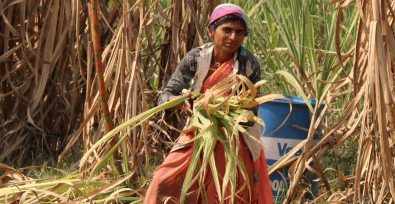In March, a joint investigation by The New York Times and The Fuller Project exposed the dark reality behind sugarcane production in Maharashtra, India. The report revealed widespread practices of debt bondage, coerced hysterectomies, child labor, and child marriage—tainting some of our favorite foods like Ben & Jerry’s ice cream. Another report showed children were trafficked from other parts of India to endure grueling work in the sugarcane fields. But the cherry on top was the complete lack of accountability from all involved parties, including the government. Today, we learn why this impunity persists.
“No one is on our side”
In Maharashtra, sugar is a powerful industry tightly controlled by sitting lawmakers or political figures, with major buyers like Coca-Cola and Pepsi. The investigation revealed that many of the state’s sugar mills are run by politicians, including 21 state lawmakers, national Parliament members, ministers, and former officials from various parties. Many other mills, though not directly run by the government, maintain business or family ties with politicians and lawmakers.
This widespread political involvement means that those in positions to protect workers are often the ones benefiting from their exploitation. This year, both Coca-Cola and Pepsico pledged to investigate abuses identified in their supply chains, but they have provided no detail on what steps they have taken.
Abuse linked to the system of recruiting laborers
In Maharashtra, sugarcane workers typically do not own land. Because of this, laborers are excluded from the cooperative system and instead receive a seasonal advance from contractors funded by the mills. Despite labor laws meant to protect workers, mill leaders claim their reliance on middleman contractors absolves them of responsibility for labor conditions. These contractors, often inexperienced young men, also deny accountability, as they merely distribute the mills’ money to the laborers. The government has not enforced labor laws on these contractors, allowing the exploitative system to persist.
As a result, sugarcane cutters are denied basic worker protections, such as minimum wage and sick days. Instead of receiving paid leave, workers must compensate their contractors for any time off, even for medical appointments. This system forces many women to forgo regular gynaecological care and instead pursue drastic measures like hysterectomies to address common health issues, such as painful periods or cysts, or as a misguided prevention against uterine cancer.
Archana Ashok Chaure, a sugar laborer in her mid-30s said:
“No one is on our side,”
Chaure has cut sugar for a Coca-Cola supplier since she was about 14, and suffered severe side effects last year after a hysterectomy that medical records showed was unnecessary.
“I have not come across such things”
In 2019, state lawmaker Neelam Gorhe uncovered a disturbing rise in unnecessary hysterectomies among female sugarcane workers in Maharashtra. She reported her findings to the state’s health minister and the region’s sugar regulator, urging the government to provide workers with basic services such as toilets, running water, and a minimum wage, as required by Indian law. However, Gorhe’s report was largely ignored, and no further investigations or laws followed.
When asked about the hysterectomies, Balasaheb Thorat, a former state revenue minister from the Congress party said:
“I have not come across such things” …“I have not heard a single woman complain to me about these issues,”
Government officials have used their influence to maintain the status quo, downplaying or denying the abuses in court and dismissing evidence of hysterectomies as exaggerated or false. After the investigation, the U.S. Department of Labor added Indian sugar cane to its list of products made with forced labor.
The fate of sugar laborers, uncertain
Last year, the acting chief justice of Maharashtra’s top court, after reading an article about the poverty and marginalization of sugarcane laborers, took action by opening a case. He requested submissions from government officials, industry leaders, labor activists, and researchers.
A court-appointed inquiry found evidence of child labor, but an affidavit from state agencies denied its prevalence, claiming sugarcane cutting was too difficult for children. Laborers interviewed by The Times and The Fuller Project contradicted this claim, revealing that many had started working as children. A Times photographer even witnessed children cutting cane, while others were reported to assist with tasks like fetching water.
Despite these findings, the government pointed to housing provisions for workers and the efforts of a state welfare board, while denying the existence of debt bondage. The affidavit claimed workers were “free to move,” though contractors acknowledged that families were unlikely to repay their debts within a single season.
India’s notoriously backlogged court system has slowed the case’s progress, and although a hearing is expected, no date has been set, leaving the outcome uncertain.
Join the fight for putting people before profit everywhere
Freedom United is fighting for the entire business world to be required through legislation to take responsibility throughout their supply chains for human rights abuses and modern slavery. There must be a systemic shift that puts people before profit. This would give victims, such as those affected in the Indian sugarcane production industry, a means of recourse and facilitate the prosecution of irresponsible companies. Take action by signing our petition urging the passing of mandatory human rights due diligence laws!







Freedom United is interested in hearing from our community and welcomes relevant, informed comments, advice, and insights that advance the conversation around our campaigns and advocacy. We value inclusivity and respect within our community. To be approved, your comments should be civil.
Slavery and Sugarcane, nothing has changed, while the consumers in first world countries plays ignorant.
Leave children and their families alone. Let them grow up to earn a living without having to be exploited